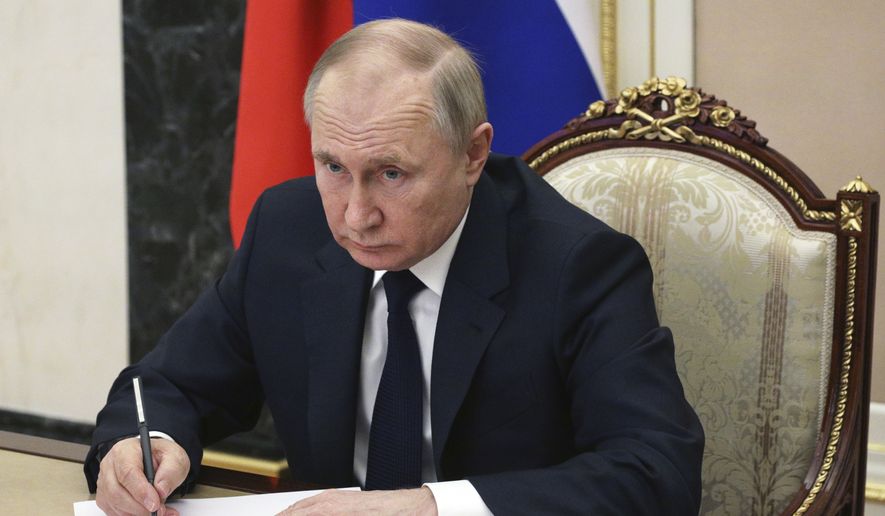OPINION:
The whole world is watching Russia’s ongoing invasion of Ukraine. And in response, Congress has been working on a bipartisan bill to impose broad sanctions on Russia. This effort should receive unanimous support since the United States is the world’s leading democratic nation. However, in the slippery, bureaucratic world of Washington, it appears that Congress’s pending Russia sanctions bill may have been stripped of its teeth. That’s because the White House — and President Joe Biden himself — intervened and asked Congress not to strip Russia of its “normal” trade relations status with the U.S.
This was a drastic misstep. But now it appears that Congress is moving forward anyway — and will pursue bipartisan legislation specifically to eliminate Russia’s current, robust access to the U.S. consumer market.
In December 2012, the United States formally granted “permanent normal trade relations” (PNTR) to Russia. Doing so meant that Washington viewed Russia as an emerging democracy — and worthy of open trade. And so, with PNTR established, Russia could start selling more goods to the U.S. — and enjoy the same low tariff rates that Washington awards to friendly countries such as Great Britain and Canada.
A decade on, though, Russia has invaded a sovereign nation, and the Biden administration is scrambling to respond. President Biden has issued an executive order banning Russian energy imports to the U.S. — a move that will undoubtedly hurt Russia’s bank account. But as of now, Russia still enjoys PNTR status, which means it can sell plenty of other products in the United States.
Initially, Congress had looked to do more than just ban Russian fuel exports. Legislators were working on a bill that would also revoke Russia’s PNTR status, authorize new tariffs, and press for a suspension of Russia’s membership in the World Trade Organization (WTO). However, after the White House banned Russian energy exports, the bill was downgraded. Now, the legislation simply calls for a review of Russia’s WTO access and ramps up human rights legislation needed to pursue further sanctions against Putin’s regime.
This is insufficient. And backing off from revoking Russia’s PNTR would be a mistake.
For one thing, allowing Russia to remain in PNTR means Mr. Putin’s war machine still has full access to America’s consumers. And Russian exports will still face only a 3.4% average tariff when entering the U.S. — the exceptionally low, generous rate that the United States extends to its friends around the world.
In broader terms, though, allowing Russia’s PNTR status to continue sends a terrible message. It gives the appearance of placing commerce above conscience — since importers perennially press for similar treatment of goods from China and other adversarial nations.
There are rumblings in Washington that Mr. Biden’s push to take PNTR off the table—and to avoid imposing heavier tariffs on Russia — was motivated by concerns over consumer inflation. But this is short-sighted. In 2021, imports from Russia to the U.S. totaled $30 billion-—only a tiny slice of the $2.8 trillion in imports that the United States took in from the rest of the world. And much of that was oil and natural gas. Since President Biden is already banning Russian fuel, imposing higher tariffs on other Russian imports wouldn’t amount to much of an impact on U.S. shoppers.
Really, this is about messaging—and doing what’s right. Vladimir Putin’s war against a sovereign, democratic nation is unacceptable. And the United States should be sending an unambiguous message of complete rejection and condemnation. There’s simply no justification for Russia to continue enjoying the benefits and privileges of low-tariff access to the U.S. market.
It’s evident that Vladimir Putin’s despicable actions in Ukraine have deeply impacted lawmakers in Congress. And many have made clear that Russia no longer deserves to receive special trading rights with the United States.
Ironically, Mr. Biden has now done an about-face and is calling for the elimination of Russia’s PNTR status.
Congress should swiftly end Russia’s PNTR status—and work to impose every possible trade and financial sanction that can limit Russia’s ability to wage war. Nothing less should suffice.
• Michael Stumo is CEO of the Coalition for a Prosperous America. Follow him at @michael_stumo




Please read our comment policy before commenting.